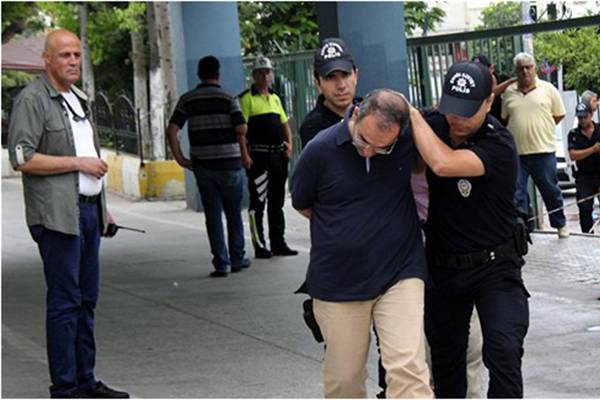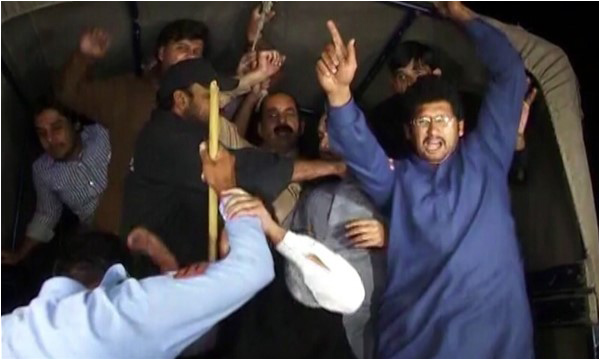
Interior Minister Nisar Ali Khan gleefully greeted Imran Khan’s decision to shelve his Nov 2 ‘lockdown’ plans of Islamabad with a “no winners or losers today” declaration. “Today Pakistan has won… Pakistan’s win is in peace, democracy, rule of law and reliance on our institutions.” For his part, Imran Khan declared a moral victory, fruition of two decades of struggle against the corrupt status quo, as he puts it.
Nisar in theory was right. In practice, his statement was quite short, hitting on all four catchwords: peace, democracy, rule of law and reliance on institutions. But, ironically, the federal government’s response to Imran Khan’s threat went against the spirit of these very words. The “container” response to the PTI lockdown, the relentless shelling on the motorway to prevent Khyber Pakhtunkhwa Chief Minister Pervez Khattak from entering Islamabad, the mockery of the rule of law by erecting barriers on roads leading to the national capital, and the excessive brutal deployment of the Punjab police to contain PTI zealots.
Why has it all happened? Dear friend Mosharraf Zaidi sums it up: “The obduracy of the prime minister in mishandling the Panama Papers issue from day one—and thereby smothering his government with the toxin of opacity. The questions that the leaks from the Mossack Fonseca’s files have raised are not trivial. They go to the heart of the most basic and fundamental principles of fiduciary responsibility in executive offices in a democracy. In short, no country can afford to have its top leaders and their families embroiled in financial opacity and expect to enjoy sustained sovereignty.” Is there no accountability in democracy? Did Nixon get away with his Watergate caper? Were no questions asked of Clinton, and didn’t the impeachment process start when the Monica Lewinsky scandal broke into the open, asks Ayaz Amir in his column. If there is no accountability in Pakistani democracy, if the Sharifs won’t answer questions raised by the Panama leaks, what alternative does Imran Khan or anyone else concerned with these matters left with? Indeed, accountability of the Panama Papers is the latest stick that Imran Khan wielded, taking the fight to the streets, setting the government into over-drive.

The larger picture emerging from the acrimonious exchanges, which culminated in all stakeholders taking recourse to the Supreme Court as the ultimate arbiter of lego-political matters, certainly points to a fledgling but maturing democracy. This process continues to expose the weaknesses of the system as well as those of key stakeholders on either side of the fence, politicians, the media, the legal fraternity and the establishment alike.
Despite the upheaval, though, Pakistanis remain fortunate to have an independent judiciary, though not without loyalists of this or that party. The media, despite its blatant shortcomings and obvious commercial incentives, continues to shine and whine.
Consider this: No judge, journalist, general or rival business is in jail, unlike in Turkey, where President Erdogan, an apparent inspiration for Nawaz and Shahbaz Sharif, has persisted with mass purges of perceived rivals and sympathisers of Fethullah Gülen. On October 29 alone, his administration fired at least 1,267 academics from universities across Turkey, bringing the total of number of academics treated this way to 6,337.
Ever since the controversial coup in August, the massive crackdown by Erdogan’s AKP has seen dismissals of some 4,719 military officers, 3,640, judges and prosecutors. Also, as many as 3.250 entities, believed to belong to or sympathetic with Gülen, have been shut down or seized (1,284 schools, 800 dormitories, 15 universities, 129 foundations, 35 hospitals, 1,125 associations, 19 trade unions, 180 media outlets). The latest victims were some 15 pro-Kurdish papers and media organizations late last month. The largest Zaman media group is already in the clutches of the government. All this from a country that is otherwise perceived to be so close to Europe.
Here at home, we must take heart that despite the rupture in civil-military relations following the October 6 Dawn story, and the noises by Imran Khan and his detractors (PML-N and ANP), Pakistan is beyond the threat of a direct coup or mass discriminatory lay-offs or arrests that Turkey has been witnessing since its so-called coup.
What is nevertheless clear is that elections under the existing electoral system will not revolutionize the outcome. Elections will not break the alliance among the forces that uphold the status quo. The system allows calculated victories to its mighty and well-entrenched players. Equally daunting an obstacle is the criminal justice system on whose shoulders accountability rests. Plea bargain for the looters of public money and the abusers of power, allowing those with political and financial muscle need to be reconsidered. This needs massive reform. This should be the biggest focus and the outcome of the Supreme Court’s Panama venture.
Imtiaz Gul heads the independent Centre for Research and Security Studies in Islamabad
Nisar in theory was right. In practice, his statement was quite short, hitting on all four catchwords: peace, democracy, rule of law and reliance on institutions. But, ironically, the federal government’s response to Imran Khan’s threat went against the spirit of these very words. The “container” response to the PTI lockdown, the relentless shelling on the motorway to prevent Khyber Pakhtunkhwa Chief Minister Pervez Khattak from entering Islamabad, the mockery of the rule of law by erecting barriers on roads leading to the national capital, and the excessive brutal deployment of the Punjab police to contain PTI zealots.
No judge, journalist, general or rival business is in jail, unlike in Turkey, where President Erdogan, an apparent inspiration for Nawaz and Shahbaz Sharif, has persisted with mass purges of perceived rivals and sympathisers of Fethullah Gülen. On October 29 alone, his administration fired at least 1,267 academics from universities across Turkey, dismissed 4,719 military officers, 3,640, judges and prosecutors
Why has it all happened? Dear friend Mosharraf Zaidi sums it up: “The obduracy of the prime minister in mishandling the Panama Papers issue from day one—and thereby smothering his government with the toxin of opacity. The questions that the leaks from the Mossack Fonseca’s files have raised are not trivial. They go to the heart of the most basic and fundamental principles of fiduciary responsibility in executive offices in a democracy. In short, no country can afford to have its top leaders and their families embroiled in financial opacity and expect to enjoy sustained sovereignty.” Is there no accountability in democracy? Did Nixon get away with his Watergate caper? Were no questions asked of Clinton, and didn’t the impeachment process start when the Monica Lewinsky scandal broke into the open, asks Ayaz Amir in his column. If there is no accountability in Pakistani democracy, if the Sharifs won’t answer questions raised by the Panama leaks, what alternative does Imran Khan or anyone else concerned with these matters left with? Indeed, accountability of the Panama Papers is the latest stick that Imran Khan wielded, taking the fight to the streets, setting the government into over-drive.

The larger picture emerging from the acrimonious exchanges, which culminated in all stakeholders taking recourse to the Supreme Court as the ultimate arbiter of lego-political matters, certainly points to a fledgling but maturing democracy. This process continues to expose the weaknesses of the system as well as those of key stakeholders on either side of the fence, politicians, the media, the legal fraternity and the establishment alike.
Despite the upheaval, though, Pakistanis remain fortunate to have an independent judiciary, though not without loyalists of this or that party. The media, despite its blatant shortcomings and obvious commercial incentives, continues to shine and whine.
Consider this: No judge, journalist, general or rival business is in jail, unlike in Turkey, where President Erdogan, an apparent inspiration for Nawaz and Shahbaz Sharif, has persisted with mass purges of perceived rivals and sympathisers of Fethullah Gülen. On October 29 alone, his administration fired at least 1,267 academics from universities across Turkey, bringing the total of number of academics treated this way to 6,337.
Ever since the controversial coup in August, the massive crackdown by Erdogan’s AKP has seen dismissals of some 4,719 military officers, 3,640, judges and prosecutors. Also, as many as 3.250 entities, believed to belong to or sympathetic with Gülen, have been shut down or seized (1,284 schools, 800 dormitories, 15 universities, 129 foundations, 35 hospitals, 1,125 associations, 19 trade unions, 180 media outlets). The latest victims were some 15 pro-Kurdish papers and media organizations late last month. The largest Zaman media group is already in the clutches of the government. All this from a country that is otherwise perceived to be so close to Europe.
Here at home, we must take heart that despite the rupture in civil-military relations following the October 6 Dawn story, and the noises by Imran Khan and his detractors (PML-N and ANP), Pakistan is beyond the threat of a direct coup or mass discriminatory lay-offs or arrests that Turkey has been witnessing since its so-called coup.
What is nevertheless clear is that elections under the existing electoral system will not revolutionize the outcome. Elections will not break the alliance among the forces that uphold the status quo. The system allows calculated victories to its mighty and well-entrenched players. Equally daunting an obstacle is the criminal justice system on whose shoulders accountability rests. Plea bargain for the looters of public money and the abusers of power, allowing those with political and financial muscle need to be reconsidered. This needs massive reform. This should be the biggest focus and the outcome of the Supreme Court’s Panama venture.
Imtiaz Gul heads the independent Centre for Research and Security Studies in Islamabad

